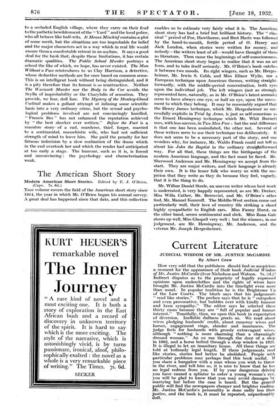The American Short Story
Modern American Short Stories. Edited by E. J. O'Brien. (Cape. 7s. 6d.) THIS volume covers the field of the American short story since 1914, the year in which Mr. O'Brien began his annual survey. A great deal has happened since that date, and this collection
enables us to estimate very fairly what it is. The American short story has had a brief but brilliant history. The " clas- sical " period of Poe, Hawthorne, and Bret Harte was followed by the hand-to-mouth, fertile period of 0. Henry and Jack London, when stories were written for money, and nobody—the writers least of all—would have thought of then, as literature. Then came the beginnings of self-consciousness. The American short story began to realize that it was an art form, and to take itself seriously. Mr. O'Brien's book catches it between two moods. Its right wingers, such as Mr..Herges- heimer, Mr. Irwin S. Cobb, and Miss Elinor Wylie, use a European technique upon American themes, writing straight- forwardly, with the middle-period concentration, both eyes upon the individual job. The left wingers (not as strongly represented here, naturally, as in Mr. O'Brien's latest annuals) seem to have always one eye, or half an eye, upon the move- ment to which they belong. It may be reasonably arguedthat the Henry James technique, which Mr. Hergesheimer so suc- cessfully exploits in Trial by Arms, is just as self-conscious as the Ernest Hemingway technique which Mr. Whit Burnett uses, with less success, in Two Men Free : but the real difference is that one has been assimilated, the other not. Several of these writers seem to use their technique too deliberately. It does not seem to be a necessary part of the story, and one wonders why, for instance, Mr. Waldo Frank could not tell us about his John the Baptist in the ordinary straightforward way. For all that, these things are the birthpangs of the modern American language, and the fact must be faced. Mr. Sherwood Anderson and Mr. Hemingway we accept from the start. They are major writers, and their language is already their own. It is the lesser folk who worry us with the sus- picion that they write as they do because they feel, vaguely, that it is the thing to do.
Mr. Wilbur Daniel Steele, an uneven writer whose best work is underrated, is very happily represented, as are Mr. Dreiser, Miss Willa Cather, Mr. Bercovici, and Mr. O'Brien's other find, Mr. Manuel Komroff. The Middle-West section come out particularly well, their love of country life striking a chord highly sympathetic to English ears. Miss Fanny Hurst, on the other hand, seems sentimental and slick. Miss Zona Gale shows up well, Miss Glaspell very well ; but the winners, in our Judgement, are Mr. Hemingway, Mr. Anderson, and the veteran Mr. Joseph Hergesheimer.








































 Previous page
Previous page